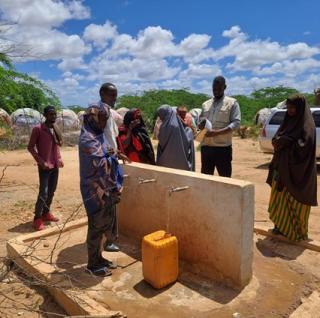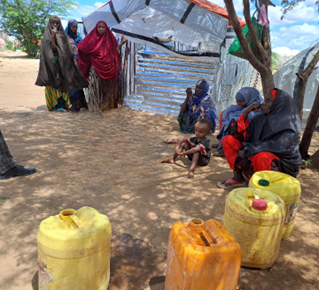USAID Helps Displaced People in Somalia Access Water
Before the recent drought hit Somalia, Habiba Ismail Ali considered herself a successful farmer. In her hometown in Somalia’s Gedo Region, she managed a thriving 2-hectare farm and grew a diverse array of crops such as maize, sorghum, and cowpeas. She and her family tended to dozens of animals, including sheep, goats, and a donkey that could help transport water and firewood. For years, her crops flourished and her herds grew - providing enough food for her 10 children.
For the last three years, Somalia experienced the worst drought in 40 years. Once-lush fields turned barren, crops withered away under the scorching sun. Over the last few years, natural and manmade water sources dried up, making it impossible to sustain Habiba’s farm and keep her family safe. Like thousands of other people fleeing drought conditions across Somalia, Habiba and her family sought refuge in a camp for internally displaced people (IDP).
“Before this prolonged and devastating drought hit our community, I was able to feed my household properly because I used to produce surplus sorghum, maize and cowpeas and I could even sell milk from my livestock,” said Habiba.
An estimated 6.4 million people in Somalia lack adequate water access and many critical water points have dried up. Water shortages and price hikes have led to displacement and increased risks of waterborne disease outbreaks. The water issues are largely due to the lack of functioning water infrastructure and management, which are exacerbated by worsening drought conditions and climatic shocks in the region. Somalia’s water issues directly fuel a chronic food insecurity crisis in the country. USAID and the Ukraine Supplemental funding enable USAID to address food insecurity through the rehabilitation of key water infrastructure in impacted areas of Somalia.
Habiba’s family currently lives in the Bakaal IDP camp, in the Bardhere district of Gedo region. The camp provides access to life-saving humanitarian assistance and is a safe haven for more than 500 families who fled drought conditions in nearby areas. However, the recent influx of displaced people has strained the camp's already limited resources and infrastructure. Overcrowding and limited access to clean water means that waterborne diseases easily spread and there is not enough water to drink or use for cooking.
Through a project co-funded by USAID and the UK Foreign, Commonwealth and Development Office, the Building Resilient Communities in Somalia (BRCiS) Consortium provides a life-saving package of interventions including nutrition and health support, cash transfers, and access to water. In Bakaal, USAID and BRCiS created a unique project to connect private water companies to the community. USAID wanted to bring urgent relief to the people in the camp, while helping the community find sustainable solutions to the water crisis.
The first step was establishing new water points in the camp to bring in clean water. USAID worked with a private water company to installed a solar-powered electro-mechanical and piping system with two easily accessible water kiosks and a water well. The piped water system now spans 3.5 kilometers, distributing safe drinking water throughout the community.
The partnership between USAID and the water company demonstrates the power of public-private partnerships in creating sustainable solutions that positively impact communities. Following a participatory approach, community leaders were empowered to take charge of the entire implementation process, while the WASH committee members represented the community's interests.
Primary Text“Having this water point here is such a relief for us. It has provided us with sustainable and clean water, significantly addressing the water-related illnesses that were prevalent before"
The USAID BRCIS provided 70% of the total project cost, and 30% of the project cost was borne by the private partner. This highlights the major investment capability of the local private sector. The local water company also pledged to maintain the new water points for the first six months.
These partnerships foster a sense of collective responsibility and enhance the overall well-being of the people they serve. The company will provide free water for the initial six-month period, followed by a transition to a subsidized pricing model tailored to the IDPs' financial capabilities. By integrating this criterion into the selection process, the authorities demonstrated their commitment to the well-being of the IDPs and the long-term sustainability of their water supply.
Community leaders were deeply involved in the implementation of the water supply system in the IDP camp. They negotiated with the private company, coordination with field staff, providing updates and reporting and monitoring the sanitation and hygiene in the community.
Habiba is deeply grateful for the water source that has brought immense relief to her and other IDPs. Previously, they had to undertake long and dangerous journeys in search of water, putting themselves at risk. Fortunately, the implementation of the water system brought the water collection point closer to their homes. Women in the camp are no longer burdened with long treks to collect water, and they have time to engage in other activities and some have been able to started working to contribute to the household income.
“Having this water point here is such a relief for us. It has provided us with sustainable and clean water, significantly addressing the water-related illnesses that were prevalent before…It was a constant struggle to obtain clean drinking water. We express our heartfelt gratitude to the funders of this project, their support has made a remarkable difference in our lives,” said Habiba.


